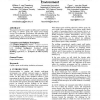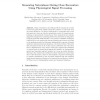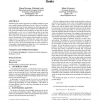35 search results - page 2 / 7 » Curious agents and situated design evaluations |
ATAL
2005
Springer
14 years 29 days ago
2005
Springer
This paper describes how cognitive modeling can be exploited in the design of software agents that support naval training sessions. The architecture, specifications, and embedding...
IEAAIE
2009
Springer
14 years 2 months ago
2009
Springer
Many researchers in the HRI and ECA domains try to build robots and agents that exhibit human-like behavior in real-world close encounter situations. One major requirement for comp...
AAMAS
2008
Springer
13 years 7 months ago
2008
Springer
Recommender systems have been developed for a wide variety of applications (ranging from books, to holidays, to web pages). These systems have used a number of different approache...
ATAL
2003
Springer
14 years 22 days ago
2003
Springer
Traditional goal-oriented approaches to building intelligent agents only consider absolute satisfaction of goals. However, in continuous domains there may be many instances in whi...
AAAI
2006
13 years 9 months ago
2006
DTGolog, a decision-theoretic agent programming language based on the situation calculus, was proposed to ease some of the computational difficulties associated with Markov Decisi...



